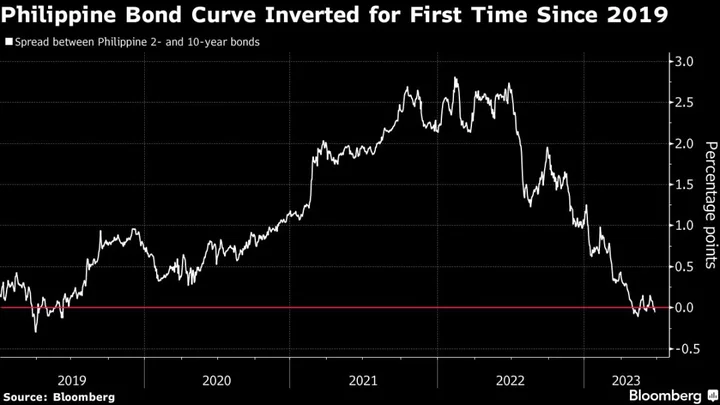Shorter-maturity Philippine bonds look increasingly favorable relative to longer-dated ones, aided by the central bank’s pivot to an easing stance, which will also boost lending in the economy.
Emerging Asia’s formerly most hawkish central bank sent the two-to-10-year curve into inversion in May for the first time since June 2019. Yields have stayed around those levels since. But Bangko Sentral ng Pilipinas’s decision to cut the reserve requirement ratio — by 250 basis points versus an expected 200 basis points — should ease pressure on shorter yields, which will help the sovereign curve steepen.
“The reserve requirement ratio cut increases demand for short-term government securities” as institutions would optimize returns on excess peso funds effectively infused into the financial system, said Michael Ricafort, chief economist at Rizal Commercial Banking Corp. in Manila.
The spread between two- and 10-year bonds dipped below zero in May, following a cumulative 425 basis points of rate hikes from the BSP since 2022. That was the largest tightening cycle among emerging Asia economies as the central bank sought to tame surging price pressures. But inflation is now slowing, with the consumer-price index dropping to 6.1% in May from a 15-year high of 8.7% in January. June inflation figures are due Wednesday, and are expected to decelerate further to 5.5%, according to economist estimates.
Philippine authorities signaled the central bank would consider cutting rates in the first quarter of 2024, or if inflation comes in below 4% for two months. Rate cuts are expected to begin in that period, according to the median estimate of economists surveyed by Bloomberg. Some money managers though speculate easing may begin as early as the fourth quarter as gross domestic product may undershoot government estimates of above 6% growth.
Leading the Way
Among the core Asia markets, the Philippines has “led the way in monetary easing, after having delivered the most aggressive tightening in the region,” HSBC strategists Pin Ru Tan and Himanshu Malik wrote in a note last week.
Shorter-maturity yields, which are more sensitive to rate expectations, may move in advance of the actual rate cut if history is a guide. Peso two-year yields started declining around five months ahead of eventual rate cuts in May 2016 and May 2019, as shorter yields fell by around 100 basis points on both occasions before the rate cut. Declining two-year yields would support a steepening in the sovereign yield curve.
“We expect the bond curve to steepen” as the RRR cut adds net liquidity into the system, the HSBC strategists said.
(Updates upcoming June inflation data in paragraph four)

